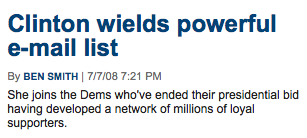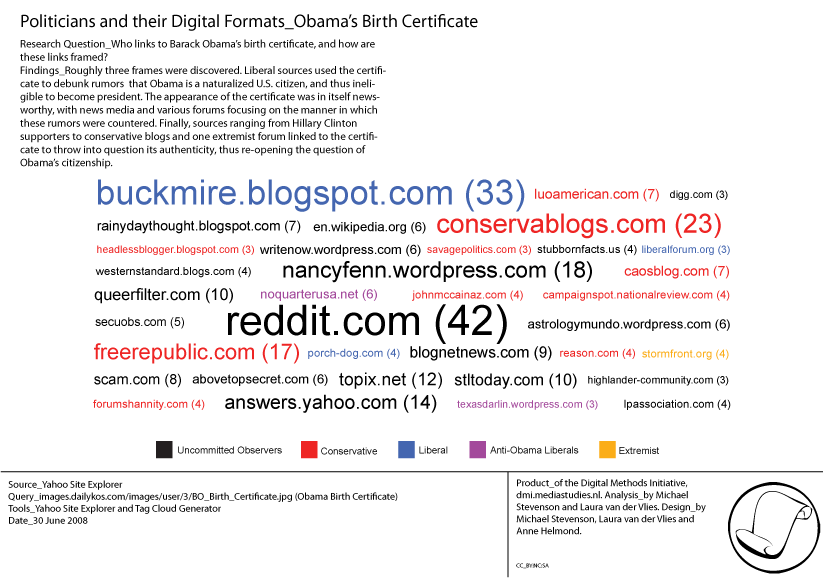You are here: Foswiki>Dmi Web>SummerSchool2007>PDFPolitics (29 Oct 2012, ErikBorra)Edit Attach
Politicians and their Digital Formats

What (election) content for what (digital) format?
Among the ways in which an election campaign or candidate may be considered mediagenic or media-savvy, one increasingly counts among them some measure of Web-friendliness. So where Howard Dean was championed as the first netroots candidate, Barack Obama appears to be winning the "online political war" against John McCain ( link). The effects of the Web on election outcomes and the manner in which campaigns are conducted has been a topic of interest for journalists and other observers. The Personal Democracy Forum's Techpresident website, for example, tallies each candidate's MySpace friendships, YouTube viewership and blog mentions via Technorati, speculating on "how the candidates are using the Web and how the Web is using them".
Addressing the question of how candidates and the Web impose on one another, many have noted the significance of viral online videos, a YouTubization of election politics. A milestone in this respect came in 2006, when a video of Republican senator George Allen using a racist slur became available, and quickly spread to the political blogosphere and then to mainstream media outlets. Of interest was both the specific case and how YouTube might change or exacerbate the nature of campaigning.
What are the three scariest words in American politics?
Caught on tape.
It's a video epidemic, coming directly to your computer on YouTube.
Virginia Sen. George Allen was looking right at a hand-held video camera last week when he called a staffer of Indian descent from his opponent's campaign "Macaca,'' a term considered derogatory. (link)
Allen's lead in the polls diminished, and he went on to lose the election.
Qualifying what could be called network determinism ("It's a video [or blog post or photo or theme song] epidemic, coming directly to your computer"), and independent of measures of distribution (links), debate (comments) and reach (hits, views, clicks), here the question is how formats might affect or afford types of content and subsequent use.
Using online video as a baseline for this thought experiment, one could begin its classification with the scandal: 'caught on tape'. But a quick review of other well-known election videos helps to refine this description. In January 2008, a visibly fatigued Hillary Clinton teared up while at an informal breakfast. Recorded a day before the New Hampshire primary, the video was headline news, and presented a 'softened' portrait of Clinton. Tellingly, a presumed cause of this unscripted moment was exactly the scripted nature of campaigning - the cumulative effect of keeping up appearances, stump speeches, policing one's every remark to avoid saying the wrong thing (and getting caught on tape doing so). More recently, the Obama campaign released a "must watch" video of the candidate addressing his staff after winning the primary. The video, like Clinton's, could be said to derive its authenticity in part from the informal setting and hand-held aesthetic.
So alongside official content such as advertisements, speeches and press conferences (networked Television), then, from the perspective of campaigns YouTube could be said to be suited for the unscripted moment. Or, perhaps, YouTube unsettles the scripted/unscripted divide: George Allen's infamous comments were made at a public campaign stop, while many have charged that Hillary Clinton's tears themselves were planned.
What of other formats, though? Which messages have optimal channels, whether the 'dark Web' of email, or the more stylish Tweet or Flickr photo? Resembling more traditional considerations of message carrier (which surrogate to put forward) and timing (burying unfavorable news), it seems likely campaigns will make strategic decisions regarding the (digital) form a message takes, and base these on perceived affordances of the formats available.
Politics of PDF
The Portable Document Format (PDF) is the file format created by Adobe Systems in 1993 for document exchange. PDF is a fixed-layout format used for representing two-dimensional documents in a manner independent of the application software, hardware, and operating system [...] PDF is an open standard that has been officially published on July 1, 2008 by the ISO as ISO 32000-1:2008 ( Wikipedia).
Before looking at the types of content the politicians distribute via PDF, the DMI team considered the basic affordances of the format. Among these are portability and interoperability - a PDF can be viewed on any computer. Another is the fixed layout, which means that not only will it be viewable on all computers, it will also look the same. Perhaps it is this affordance that gives the PDF its offline, or 'non-Webby' quality: where PDFs allow authors to determine the document's appearance, design on the Web is to an extent ceded by the designer to a range of mediators, including the user's operating system, Web browser, additional or missing software and personal settings.
So if the (lack of) authenticity of online videos might be attributed to their (lack of) spontaneity, out initial understanding assumes with PDFs some degree of calculation and permanence, and would sooner associate them with fixed, scrutinized statements.
In addition to describing affordances, one could take a cue from the material semiotics of Science and Technology Studies. If a revolving door is essentially saying 'please close the door behind you,' a PDF administers thanks for not altering the content of a particular message. (Pundits say staying on message is paramount in the election campaign.) Taking advantage of additional features such as watermarking and password protection would then be equivalent to forcefully requesting, respectively, proper attribution and confidentiality. But of course with each additional request or feature, one qualitatively alters the message exchanged.
Where to host, and where to release?
| I | Attachment | Action | Size | Date | Who | Comment |
|---|---|---|---|---|---|---|
| |
DMI-tagcloud-Obama.png | manage | 81 K | 07 Jul 2008 - 08:07 | Main.Laura | DMI tagcloud Obama |
| |
clinton_wields_powerful_email_list.png | manage | 19 K | 08 Jul 2008 - 17:24 | MichaelStevenson | Screenshot of Politico.com article "Hillary Clinton wields powerful email list" |
Edit | Attach | Print version | History: r10 < r9 < r8 < r7 | Backlinks | View wiki text | Edit wiki text | More topic actions
Topic revision: r10 - 29 Oct 2012, ErikBorra
 Copyright © by the contributing authors. All material on this collaboration platform is the property of the contributing authors.
Copyright © by the contributing authors. All material on this collaboration platform is the property of the contributing authors. Ideas, requests, problems regarding Foswiki? Send feedback



